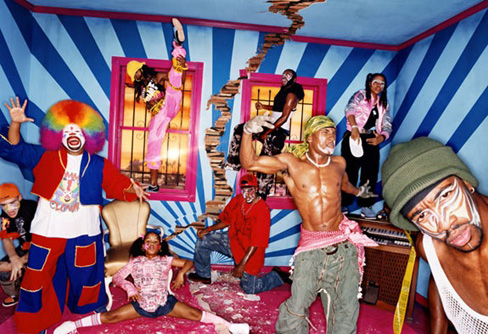In the years since W’s re-election, activists around the world have re-examined their methods. Questioning the accustomed lesser evil electoral politics, the boring rallies, the bursts of direct action, and frustrated tears, a new cohort of political actors have emerged with a new series of playful approaches. They have turned to a uniquely distinct form of community building and performance. During the summer of 2005, from Edinburgh to South Central LA, the image of clowns rummaging through the streets found its way into the public consciousness. Clowns protested the Edinburgh G8 meetings (and the clowns who were running these meetings); other clowns were featured in David LaChapelle’s thrilling documentary Rize.
In Rize, African-American clowns occupy the streets where riots shook the summers of 1965 and 1992 and urban life offers little but a generous dose of grief and oppression. Rize details a subculture inspired by Tommy Johnson (Tommy the Clown) who started a new movement in dance in 1992 as a response to the riots. It involves a highly physical form of dance which modulates between timeless tribal and urban hip-hop steps to offer an alternately despairing, angry, and joyous form of clowning. As an alternative to the state-programmed default of gang life, drugs, violence, and prisons, kids form troupes of their own who paint their faces like warriors to share space and dance. What emerges is a series of rituals and competitions between groups of “clowns” and “krumpers,” who perform, compete, and build community together. The film never turns its back on the despair of the circumstances that surround the kids; instead, the film emphasizes emotional outlets created for a cohort of youth who have grown up in a warfare state characterized by mass incarceration, HIV/AIDS, police corruption and brutality, and widespread loss.
From South Central to Edinburgh
LaChapelle’s South Central is not the only place where social actors have turned to clowning as an answer to the “There Is No Alternative” neoliberal police state. Clowns could be seen intermingled among the groupings of “Flex, temp, full-time, part-time, casual and contortionist workers, migrants, students, benefit claimers, New Dealers, work refusers, pensioners, dreamers, duckers & divers. . . , ” invited to bring “drums, music, banners, imagination” to the actions against the G8 in Central Edinburgh Scotland on July 4th, 2005. The point of the carnival was to simultaneously express resistance and assert “desires for FULL ENJOYMENT with fun in the city — and begin to make capitalism & wage slavery history.” 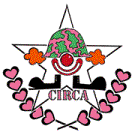 In the center ring of this circus of resistance was the Clandestine Insurgent Rebel Clown Army (or CIRCA). Organized by RTS London’s John Jordan, New York’s Larry Bogad, Bristol’s Jennifer Verson and others, CIRCA first organized itself to protest George W. Bush’s visit to Buckingham Palace in 2003. The following summer, a group in New York zapped the Republican National Clown Convention to thrilling reviews.
In the center ring of this circus of resistance was the Clandestine Insurgent Rebel Clown Army (or CIRCA). Organized by RTS London’s John Jordan, New York’s Larry Bogad, Bristol’s Jennifer Verson and others, CIRCA first organized itself to protest George W. Bush’s visit to Buckingham Palace in 2003. The following summer, a group in New York zapped the Republican National Clown Convention to thrilling reviews.
Why Clowning?
I asked Larry Bogad, the author of Electoral Guerrilla Theatre: Radical Ridicule and Social Movements and one of the organizers of CIRCA’s zaps in London, New York, and Edinburgh, why his affinity group of seasoned activists from the Global Justice Movement had decided to make use of clowning as a technique at the G8 protests.
He began with an initial caveat: “First of all, it’s just one tactic among many. Yet, the G8 is this meeting among great powers. We see it as a grim event. The power of the state intersecting with the power of markets getting together to make decisions for the next year. There is this euphemism, this power play/cover — debt relief, reducing pain — and yet the underlying agenda is for the cost of this partial debt relief: opening markets, making friendlier policies for the multinationals, making whole geographies friendlier to Western markets, extracting what they really want. But they are not telling the whole story.”
“So what is the role of the trickster within this whole spectacle? How are we to confront that kind of power and pretense, that incredible power and subtle pretense, that ‘We Are the World.’ There’s the ‘iron fist in the velvet glove.’ You’ve got the world’s leaders, wielding the greatest armed might, the fiscal might, and the greatest economic power in the world. These eight men are gonna get together and make that policy. And yet it looks very benevolent.”
“In the face of this, we wanted to articulate a radical analysis, to confront the media power, the euphemization, the celebrity power, the celebrities saying Blair and Bush were the John and Paul of the Drop the Debt movement. We figured it was a good opportunity for our trickster tactics — Bob Geldof went as far as to say, he didn’t want ‘a bunch of people dressed as clowns coming’ and wrecking his Live 8 concerts.”
“As usual, the movement was demonized in much of the press. During the protests, images of a policeman crossing clubs with a black blocker were seen on the front of newspapers around the UK. So we wanted to interrupt the flow of this imagery.”
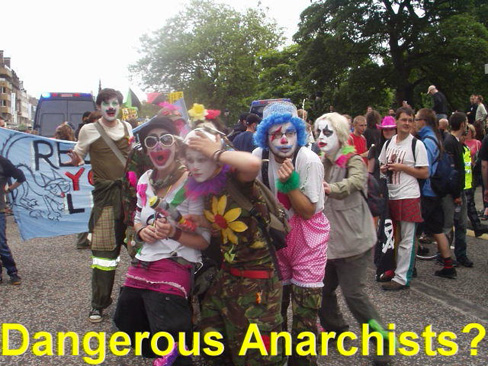
“Hence a range of ridiculous and beautiful theatrics including the much-publicized gesture of a clown kissing a policeman’s riot shield. 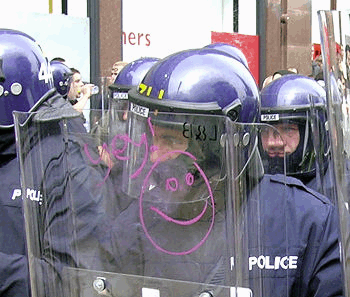 We interrupted what I refer to as the hegemonologue coming from the media, which relentlessly depicted the protestor as terrorist and Bob G. and Bush as heroes. The point was to be disruptive but in a creative, nonviolent way, engaging people, opening up a creative and personally freeing space for ourselves as well. As opposed to just being angry and ulcerating, we were opening up a different, more engaging, playful space, with an energy that is more than sustainable, it’s beneficial. It can reach police officers, passers-by, put them in a creative/interpretive/non-threatened space as well. Some may even pause and think: ‘They are absurd . . . but maybe they are both absurd and they have a point.’ That’s the idea of the wise fool. Our press release stating that these debts were fundamentally illegitimate was quoted even in right-wing papers because we were being such buffoons.”
We interrupted what I refer to as the hegemonologue coming from the media, which relentlessly depicted the protestor as terrorist and Bob G. and Bush as heroes. The point was to be disruptive but in a creative, nonviolent way, engaging people, opening up a creative and personally freeing space for ourselves as well. As opposed to just being angry and ulcerating, we were opening up a different, more engaging, playful space, with an energy that is more than sustainable, it’s beneficial. It can reach police officers, passers-by, put them in a creative/interpretive/non-threatened space as well. Some may even pause and think: ‘They are absurd . . . but maybe they are both absurd and they have a point.’ That’s the idea of the wise fool. Our press release stating that these debts were fundamentally illegitimate was quoted even in right-wing papers because we were being such buffoons.”
CIRCA’s “Anti-Official Communiqué #8.86: Operation BROWN-NOSE,” written by “Colonel Oftruth and General Confusion, Edinburgh, 30.06.05,” addresses the demonstrators at the “Make Poverty History” march:
We are so proud of you, so in love with you, we share your compassion and desire to TRULY make poverty history. We admire your realization that the only real way to end poverty, in the global South or in the suburbs of Edinburgh, is to stop the Great Eight’s amusingly antisocial habits — their rather nasty slapstick routines — kicking the poorer nations with war, arms sales, and bullying trade policies, manipulating their markets and plundering their resources while dangling the crumbs of “debt forgiveness.” We know the G8, far from being thanked for “forgiving” these illegitimate debts, should beg forgiveness from the Global South for their ongoing crimes and depredations.
CIRCA’s aim was to turn the G8 pomp and circumstance on its head. Geoff Hoyle, of San Francisco’s Pickle Clowns, has suggested that clown acts are often “about joyful sharing in attempting an insurmountable task.” The Pickle Clowns were known as a rambunctious group, often refusing to leave the stage, even when others would think their time was up. In much the same way, CIRCA’s anarchistic spirit contributes to a Global Justice Movement which refuses to leave the stage even days and years after the War on Terror was thought to have superseded it. What emerges within the dynamics of CIRCA’s opposition is a different, more spontaneous, authentic form of political engagement and citizenship. Within such a context, anarchist theorist Colin Ward suggests that, “given a common need, a collection of people will by trial and error, by improvisation and experiment, evolve order out of the situation — this order being more durable and more closely related to their needs than any kind of externally imposed authority could provide.”
What emerges within this disorder is a different sort of coherence. The Clandestine Insurgent Rebel Clown Army find inspiration from the insights of Walter Benjamin as well as Abbie Hoffman. CIRCA’s website quotes from Walter Benjamin’s “Theses on the Philosophy of History”:
The tradition of the oppressed teaches us that the “state of emergency” in which we live is not the exception but the rule. We must attain to a conception of history that is in keeping with this insight. Then we shall clearly realize that it is our task to bring about a real state of emergency.
Yet as the War on Terror becomes more and more of a continuous propaganda campaign, orchestrated by the entire straight media turned into a giant public relations department of the government, it becomes more and more difficult to propose alternate story lines. The imperative then arises to shift the paradigm, to create authentic and innovative forms of protest and community building. CIRCA turns to Abbie Hoffman’s “Museum of the Streets” notes:
One of the worst mistakes any revolution can make is to become boring. It leads to rituals as opposed to games, cults as opposed to communities and the denial of human rights as opposed to freedom.
The spirit of the clown offers another way of being in the world. As clowns are not afraid of being seen as foolish, clowning offers a route toward openly questioning conventional ways of seeing the world. Long-time ACT UP member Ann Northrup has suggested that while ACT UP members may not have had the money or access that other advocates had, they succeeded because of their willingness to endure public humiliation, if that was what was necessary to get a point across. The result was a series of very public performances which transformed the way AIDS policy was conceptualized.
Clowning was even a part of ACT UP’s work. A squadron of clowns, Operation Ridiculous, ran to and fro diverting the crowd and contributing to the spectacle during one of ACT UP’s most famous protests, the Stop the Church Action of 1989. For many, this spirit of carnival and clowning was compelling because of its expressive, emancipatory qualities. 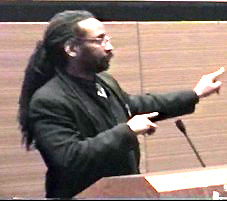 In the Spring of 2004, I attended a funeral for Keith Cylar, an ACT UP veteran and the co-president and founder of Housing Works, the nation’s most militant AIDS service organization. He’d lived with HIV for some twenty years. Like many in ACT UP, Cylar was a man who was willing to advance an agenda for homeless people living with HIV/AIDS in countless brash and innovative ways. He used to talk a great deal about the need for a joyous defiance of conventional wisdom. While the status quo suggested that things should remain the same and nothing could be done, Cylar helped create programs, housing, and funding streams for homeless communities of drug users with HIV/AIDS. At his funeral, friends read from one of his favorite passages of The Color of Light, a work of meditations for people living with HIV/AIDS. This passage highlighted a daring and caring spirituality of clowning, capable of challenging the social controls and panic.
In the Spring of 2004, I attended a funeral for Keith Cylar, an ACT UP veteran and the co-president and founder of Housing Works, the nation’s most militant AIDS service organization. He’d lived with HIV for some twenty years. Like many in ACT UP, Cylar was a man who was willing to advance an agenda for homeless people living with HIV/AIDS in countless brash and innovative ways. He used to talk a great deal about the need for a joyous defiance of conventional wisdom. While the status quo suggested that things should remain the same and nothing could be done, Cylar helped create programs, housing, and funding streams for homeless communities of drug users with HIV/AIDS. At his funeral, friends read from one of his favorite passages of The Color of Light, a work of meditations for people living with HIV/AIDS. This passage highlighted a daring and caring spirituality of clowning, capable of challenging the social controls and panic.
There is an old native North American Indian tradition called Heyoehkah. The Heyoehkahs, or sacred clowns, were people within the tribe who “did things differently,” challenged people’s thinking, shook them up. Their function was to keep their people from getting stuck in rigid ways of thinking and living. They were also known as “contraries” because they lived backwards. They walked backward, danced backward, everything they did was contrary to the norm. By their living, they symbolized the shadow of the Creator God, reminding people of their spiritual center.
For gay people, the role of a sacred clown is especially important: not only are sacred clowns often gay, the role of contrary is a sacred symbol of the role we play among society as a whole.
There has been a sacred clown response to AIDS. When the normal response was to react with fear and panic, there were people dancing backward, responding with love and confidence.
When, every day, the world began repeating a death mantra, our sacred clowns danced the dance of life. They talked about living with AIDS, surviving, healing, recovering. When normal reaction to a diagnosis was isolation, our sacred clowns dragged us into a community. When the world wanted us to be victims, they drew circles of light around themselves and stood in their power.
Whenever it got dark, they turned toward the light. Whenever people said there is no hope, they said there is always hope. Whenever people said this isn’t about us, they stood up and said, “This is about you. This is about us all. Our planet is sick. Earth has acquired an immune dysfunction. We are all living with AIDS.”
Dario Fo is quoted on the CIRCA website: “Clowns always speak of the same thing, they speak of hunger; hunger for food, hunger for sex, but also hunger for dignity, hunger for identity, hunger for power. In fact, they introduce questions about who commands, who protests.” In our police state world of market economists and CIA torturers, things are far too serious not to clown it up every time our rulers dare to show their faces in public.
Benjamin Shepard is co-editor of From ACT UP to the WTO: Urban Protest and Community Building in the Era of Globalization (Verso, 2002) and author of White Nights and Ascending Shadows: An Oral History of the San Francisco AIDS Epidemic (Cassell, 1997). He can be reached at <benshepard@mindspring.com>.

